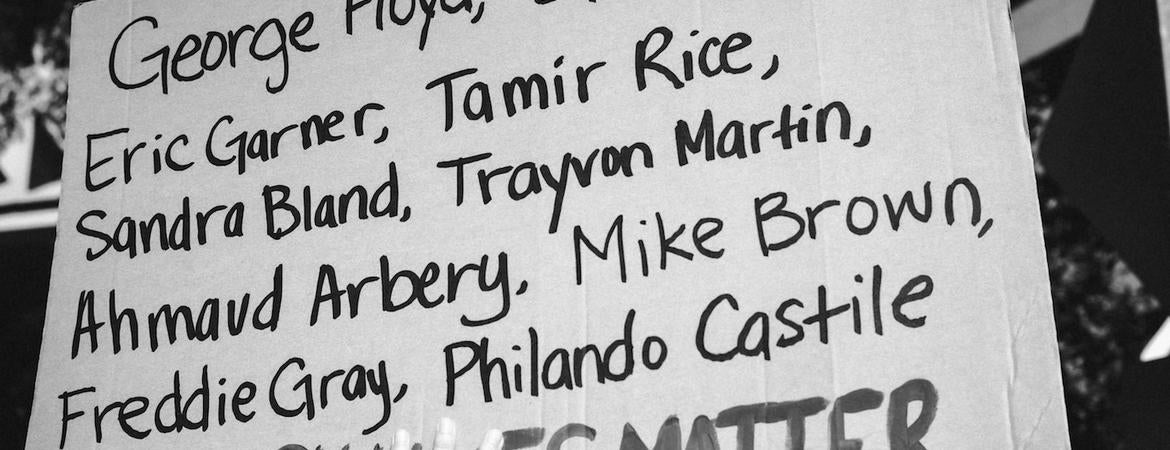
The experience of police violence is associated with mental and emotional trauma distinct from that caused by other kinds of violence, creating a public health crisis for communities most affected.
Simply put, the experience of police violence puts Black, Latino, Indigenous, and sexual minority communities at higher risk of distinct mental health problems, in addition to greater risk of death at the hands of police, according to a new paper.
The study is authored by a group of researchers at several universities, including UC Riverside, who have been examining the mental health effects of police violence at the population level for several years.
“It’s a public health issue because police violence is not experienced equally in our society but instead has a disproportionate effect on the mental health of racial, ethnic, and sexual minorities,” said Bruce Link, a UC Riverside distinguished professor of sociology and public policy. “The point of our paper is to indicate why the experience of police violence is uniquely stressful and therefore particularly impactful.”

Psychologists agree that trauma spurs biological or psychological changes that manifest over time as psychiatric symptoms, particularly when the trauma is sexually or physically violent. Research on stressful life events, especially uncontrollable events, has attempted to provide a broader framework for how stress may affect a person’s usual activities, goals, and values, but until recently this approach has not been applied to police violence.
Link, along with Jordan DeVylder of Fordham University and Lisa Fedina of the University of Michigan, reviewed numerous studies of the effects of police violence on mental health in the paper titled “Impact of police violence on mental health: a theoretical framework,” and identified eight factors distinct to police violence in America.
Police violence is state sanctioned
Unlike most other forms of violence, police violence in America is embedded in a history of state-enforced practices that permitted cruel, unusual, and dehumanizing punishment of individuals deemed to be from so-called “dangerous classes,” particularly Blacks. Communities of color and LGBTQ communities have been historically subjected to discriminatory laws, such as Jim Crow laws and sodomy laws, which permitted harassment and excessive and fatal force against individuals from these communities.
The police are a pervasive presence
Police are everywhere, especially in low-income communities of color. People who have experienced violent or stressful encounters with police have no way to avoid being around constant reminders of these painful experiences, or the fear of future encounters.
There are limited options for recourse
People who have experienced police violence have few options for redress. They must report incidents to the same police departments that abused them in the first place. Police are authorized to use force in a wide variety of situations and survivors have to prove that the violence was not legitimate. Because they have few options for reporting an incident, for legal recourse, or for advocacy services and referrals to mental health treatment, any mental health symptoms they have may worsen over time.
Police culture deters internal accountability
Violence committed through institutions, rather than interpersonal relationships, is supported by organizational cultures that condone it. Police often maintain a code of silence around violence and therefore often fail to hold each other accountable. This amounts to gaslighting survivors who do report incidents, potentially worsening mental health symptoms.
Police violence alters deeply held beliefs
Many Americans are taught that police protect them and their communities from various dangers and help in emergencies. A single violent encounter can shatter this belief for an individual, but when police violence is the norm, instead of an isolated incident, the community at large loses trust in the police as an institution and, often correctly, comes to regard them as part of the problem.
Racial and economic disparities in exposure
Police violence is disproportionately directed at people of color, especially Blacks and Latinos, potentially leading to diminished feelings of self-worth and value within American society.
Police violence is stigmatizing
Because police are allowed to use force in many situations, survivors of police violence are often blamed for the encounter. Their actions are heavily scrutinized and faulted to justify the officers’ actions, especially by members of groups that benefit from the social order policing upholds. Moreover, many people have friends and relatives who work as police officers, making it feel like a betrayal to report incidents of police violence.
Police are typically armed
Unlike police in many countries, American police carry firearms and police departments have become heavily militarized. Police are given broad latitude to determine when and how to deploy force. Every interaction with police holds the possibility of violence, and for communities subjected to routine overpolicing, this threat brings additional challenges for mental health.
The researchers call for a framework to examine the mental health consequences of police violence that takes into account these points. However, implicit in their analysis are solutions for the public health crisis caused by police violence, such as demilitarizing police, holding police accountable when untoward events occur, ending the overpolicing of communities of color, providing better reporting options and support for survivors of police violence, and policies that build mutual trust between police and the communities they are meant to serve.


